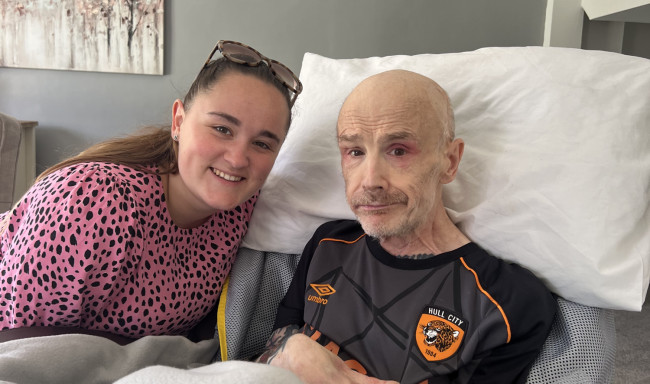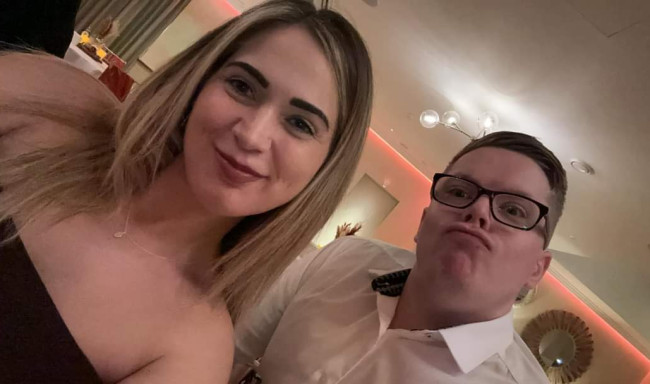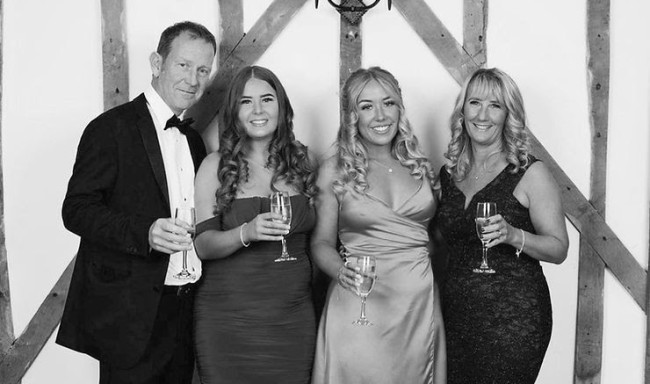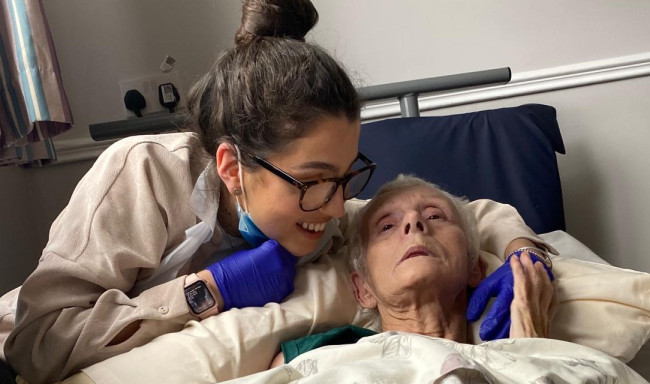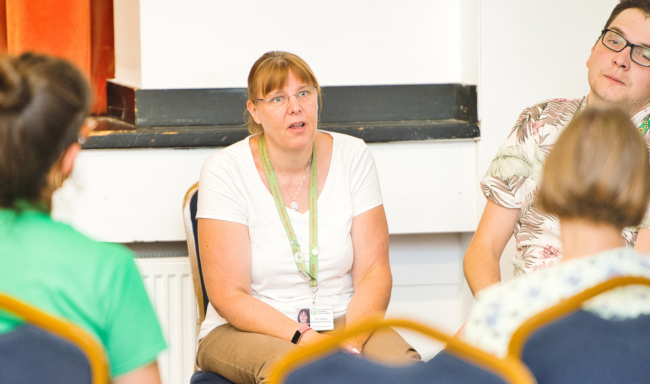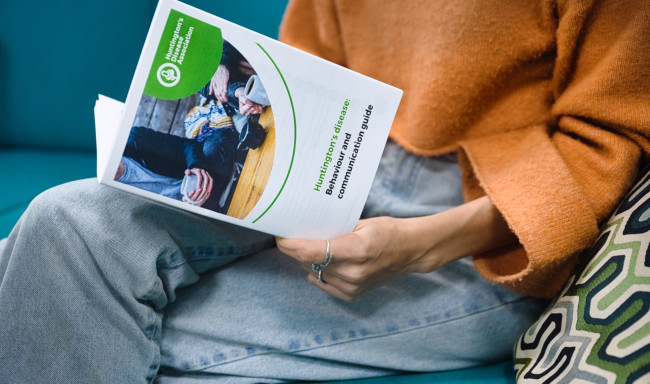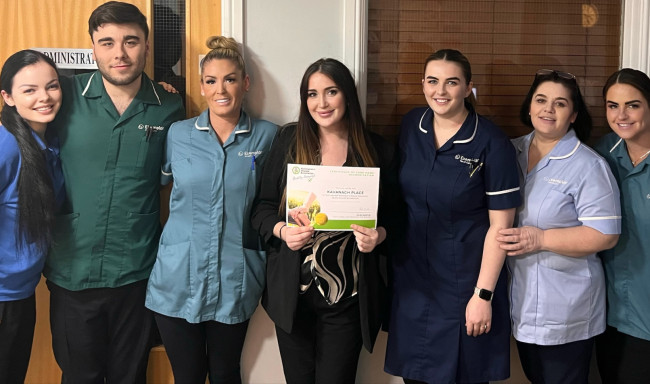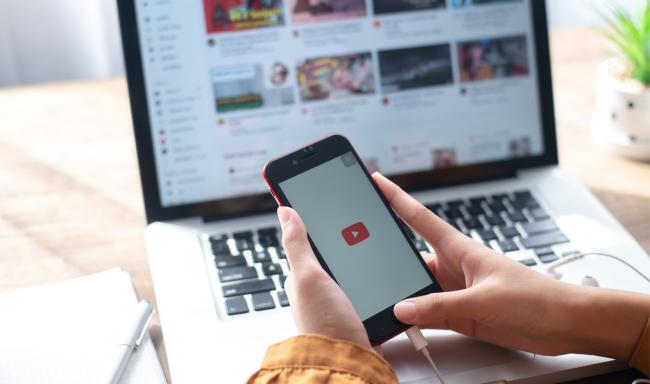Huntington's Disease News columnist and advocate, Becky, speaks about life in a Huntington's family.
Our Huntington’s history
I don't have much more information on the history of Huntington’s disease in our family apart from I know that my dad's father's mother had had it before him. I remember our dad seriously talking about Huntington's disease being in our family in the spring of 1994.
"There's a genetic test now"
he said,
"So you can find out if you carry the gene."
But, he was convinced that his father was showing signs by the age he was then (42), and believed wholeheartedly that he had escaped it. I had no reason at that time to doubt him, but with hindsight, there had been some cognitive and psychological symptoms for around four years already.
In 1991 dad lost his job and wrote off the family car by crashing it into a parked car. He cried on my shoulder, when his marriage to our mother ended in divorce.
Over the next ten years, dad shied away from undertaking DIY jobs around the house and appeared confused and unable to carry out tasks, he had previously been so capable of. He broke all the glasses in the house. A washload of ironing would take him a whole day to complete. As a family, we noticed and it had started to become more obvious something was wrong. Was it anxiety and depression? Was he just lacking in self-confidence, because he'd been out of work for so long?
By the time our third child was born in 2005, dad had started to rub his nose repeatedly, had a bouncing gait when he walked, and his feet moved a lot when at rest. His shoulders jerked. We noticed it was worse if he was stressed.
Signs of cognitive impairment
He hadn't been able to cope with working, a couple of jobs he had didn't last, because he wasn't keeping pace or managing the tasks required. He started to miss having haircuts and shaving, which he had always been so meticulous about before.
We found out he had built up a £2000 overdraft and had spent his whole month's rent money in a shop in town. He had no understanding of how an overdraft works, he seemed to believe the bank had let him have the money and it didn't need to be paid back.
Dad had been avoiding doctors and going to the dentist. I raised my concerns in 2008 with our joint family GP. He hadn't seen signs of Huntington's in my dad at that point. But by 2009 he had. He had no choice but to raise the issue with my dad, when he went for a routine appointment. Dad saw a neurologist, who confirmed it did look like Huntington's disease. A blood test then confirmed the diagnosis. 42 repeats. Dad was quiet and thoughtful about it, but never showed any emotion when given his results or at any point afterwards.
Over the next 11 years, the rate of progress took me by surprise. It felt very fast.
Additional support
We supported as much as we could but it got unmanageable for us alone, pretty quickly. We got lucky and found a wonderful personal assistant, who started working with dad. They were a similar age and had similar interests. I honestly do not know what we would have done without him. He was a wonderful carer, but also a fantastic companion too.
There was further deterioration in his mobility, a care agency was drafted in for extra visits. He needed a more pureed diet and thickener for his drinks. But eventually, his swallow got so bad, he could not live at home any longer. He could even choke on water and it was just too dangerous. In 2014 he went into a nursing home, aged 62.
We made dad's room homely and cosy. We met some wonderful carers there and got to know the other residents. They do an amazing job and I am full of admiration for them. We spent weekends, holidays and Christmas days visiting. Even watching the Red Arrows display from out on the terrace.
I then got the call that dad was in his last days.
Dad lasted a whole week, taking food still from me on my first visit. But nothing after that. I bathed his head with a flannel, moistened his lips and talked to him. I played videos from our family and friends. And tried to explain about Covid and the lockdown. We listened to music, watched TV and watched the pandemic unfolding on the news.
The staff were amazing, despite the heat, the PPE, the hard work and the enormity of a global pandemic happening around them. They kept me fed and watered and gave me a place to sleep. They were amazed how strong my dad was.

A family disease
Unfortunately my only brother began to show some cognitive impairment and psychological symptoms in their late 20's. They seemed to not be coping. By 2006 (aged 27) they had finished in their full-time teaching post and only seemed to cope with supply work. By their mid 30’s any temporary factory jobs they had taken had finished and they had stopped working altogether.
By their late 30's there were some more physical signs, the anger was worsening and their driving was dangerous. The DVLA asked the GP for a medical assessment. His driving licence was withdrawn as his gait was so unsteady.
The diagnosis was confirmed by the doctor, a neurologist and then the blood test. It had expanded to 45 repeats. My brother is just over two years younger than me. Aged 43 and he was assessed as he had lost the capacity to understand the Huntington’s disease diagnosis and the impact it has on him. The authorities would now start to take over, but have to do this in the least restrictive way.
He did not wash very often, or clean his clothes, the smell makes it uncomfortable for others to even be in the same enclosed area. He used to be a qualified and working primary school teacher and now texts us to ask why the bath mat is stuck to the floor, how an overdraft works and whether he should bathe with his socks on.
My brother cannot understand letters when they arrive, fill out forms or make full use of the Internet. Finances have been bad for years, again with a £2000 overdraft having been built up and with no understanding of how the overdraft works or the fact it needs to be paid back.
Thousands get wasted on online gaming and yet they live in a flat with very sparse, broken furniture and few possessions. They put their possessions, new and old, in the bin, believing they're not needed and taking up too much room. Like my dad, he refuses haircuts, vaccines, or medical appointments.
What has helped?
I think that my brother having routines really helps him and having text messages or things written down, helps him to organise things and remember.
Preparing him for upcoming events well in advance, to give him time to process and prepare. Keeping things quieter and calmer, with fewer people helps. He seems happier with his flat being more minimalistic, with less stuff around and less on the walls. He likes people to book in home visits with him and not turn up unannounced. He can only cope with one thing happening each day.
Our family GP has been a fantastic support to me, along with Justine Barkas and Tiffany Stevenson our Huntington’s Disease Association Specialist Advisers and the Youth Workers who have been fantastic. We also have an amazing social worker.
The ostrich or the rhino
You may have heard people being described as like a rhino or an ostrich when they get bad news. They either charge right in, going into problem-solving mode and tackling it head-on, or they bury their head in the sand and ignore it (perhaps hoping it will go away). There are pros and cons to both approaches.
- Clinical psychologist
Our mother lives in denial and can't bear it. Can't bear to look at it, can't understand the behaviour and symptoms. She can't learn anything about the disease, because it is simply too painful for her. So she buries her head in the sand and tells herself they're fine.
I first looked at taking the test myself in 1998. I met with a genetic counsellor, it frightened me. Dad wasn't too bad and undiagnosed. We hoped it prayed it wasn't the disease and I got on with my life. After my brother's diagnosis, it brought it much closer to home for me, closer to my age. I looked into getting the test. My children were getting older, they were feeling the weight of risk on them. One of them is getting married. I wanted to know for them, to help with research and trials, and of course for me to know my status.
The genetic counsellors were concerned for my mental wellbeing. I had a lot going on, I had just watched my father die from it and my brother had it. But after years of dipping in and out of counselling, I had the blood taken. It was an eight-week wait, the nearer it got to my appointment date, the more nervous I became. The more I believed I was seeing symptoms and becoming cognitively impaired. I felt physically very unwell and developed the most painful migraine I have ever had.
The day came for my results and I felt nervous initially but then I was quite calm, when it came to going into the room for my results. When the genetic counsellor said the words, "I am pleased," I knew. There was relief, I cried, but then I felt numb. I couldn't take it in, I had believed for all these years this too would be my fate. I feel the survivor's guilt for sure, and know it so easily could have been me and not my brother.
My children were of course relieved, but feel guilt about my brother (their uncle) and their child (their cousin), who is now 50% at risk.
My brother was matter of fact about my result, but is so confused that it's difficult to know the depth in which they think about it.
Our mother is so distraught about my brother's diagnosis, that she found it hard to feel as pleased for me. She has guilt and feels the unfairness of my brother having it. Although she was relieved I and her grandchildren, on my side, are OK. I found this quite hard.
I am signed on to my local Enroll-HD research study, as a negative blood relative and hope that this will help towards a cure. I feel hopeful of the progress they have made so far, to make Huntington’s disease more treatable in the near future.
I hope this helps others in the Huntington’s community and makes them feel less alone. I also hope it may reach others who may not have heard of Huntington’s disease, or who do not know much about it. It would be great to spread more awareness of Huntington’s.


